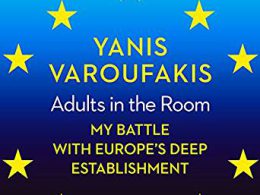Vasily Grossman’s monumental book, Life and Fate, was written over a protracted period of time and was completed in 1960. Centred on the epic second world war battle of Stalingrad, it exposes the brutal nature of Stalinist Russia. With this 2010 edition and the serialisation by BBC Radio Four, it has been made accessible to new audiences. socialistparty.net revisits this classic work.
In its sweep, in the powerful frescoes it paints of the battle of Stalingrad, conducted under the shadow of the looming presence of the monster Stalin and the bureaucratic system which bears his name, Life and Fate is a major expression of Russian 20th-century literature. It is not a modern version of Leo Tolstoy’s War and Peace to which it has been compared. Nevertheless, it is a gripping account, seen through the daily lives of different individuals and social groups during a dramatic period of Russian and world history.
When Vasily Grossman first submitted it to the official literary journal in 1960, the KGB, the political police of the ‘liberal’ Stalinist regime of Nikita Khrushchev, told him that there was no chance of it being published for another 200 years! He was free but his book was imprisoned. However, a copy was smuggled abroad and published.
Following the death of Stalin in 1953, there was a brief period, known as ‘the thaw’, when a questioning of Stalinism became possible and books like Grossman’s could have been published. Indeed, Grossman indicates that Khrushchev, who communicated his views to the author through his secretary, was at one stage sympathetic to the idea of publishing.
If, at this time, there had been a proper balance sheet of Stalinism, even one expressed in the form of a novel, the subsequent history of the ‘Soviet Union’ could have been entirely different – and the fate of Grossman’s book with it. This would have involved a thoroughgoing analysis of the causes of the bureaucratic degeneration of the Russian revolution (personified by the rise of Stalin), the character of his regime and, inevitably, the role of the Left Opposition, including the ideas and subsequent murder of a generation of the ‘old Bolsheviks’ including Leon Trotsky.
The thaw freezes over
Khrushchev, in order to defeat the unreconstructed Stalinists, was compelled to go some way in attacking the legacy of Stalin. But he was himself a product of Stalinism, without experience or knowledge of the real democratic traditions of Bolshevism and the revolution. He proved incapable of going outside of the bureaucratic machine. Moreover, he had unleashed forces that resulted in attempts at a political revolution against bureaucratic rule – including the demand for workers’ democracy – which led to the uprisings in East Germany in 1953 and, particularly, to the Hungarian revolution of 1956.
The counter-revolution that drowned this movement in blood put its stamp on the whole subsequent period throughout the Stalinist world. Subsequently, Khrushchev was removed and the Stalinist hardliner, Leonid Brezhnev, was installed. This, in turn, resulted in once more the blotting out of history, particularly of the origins of Stalinism. This meant that, when the Stalinist regime had exhausted all further possibilities for growth, symbolised in the great stagnation of the Brezhnev years, the new generation was unprepared, and subsequently fell prey to the false allure of capitalism.
Running as a thread throughout the book are constant references to Trotsky and the Left Opposition. The old Bolshevik, Mostovskoy, thinks about “Stalin’s autocratic rule, the bloody trials of the Opposition, the lack of respect shown towards the Old Bolsheviks. The execution of Bukharin, whom he had known and loved, had upset him deeply”. At the same time, the reasons why many of the old Bolsheviks confessed to crimes they had not committed and informed on others, through both misguided loyalty to the revolution and the ‘party’, are explained.
Mostovskoy muses: “He had known, however, that if he opposed the Party in any one of these matters, he would turn out, against his will, to have opposed the very cause to which he devoted his life; the cause of Lenin. At times he had been tormented by doubt. Was it just cowardice that stopped him from speaking out? There had been many terrible things at that time. Yes, he would have given anything to talk once again to his friend Lunacharsky – they had always understood one another so quickly, so easily”.
The battle of Stalingrad
Grossman also counterposes the horrors of the Nazi concentration camps to the similar fate experienced by those in the Stalinist camps. There is an incredibly moving account of the last moments of a young boy and woman in the Nazi gas chambers. He also recreates the intensity of the close encounters between both sides in the battle of Stalingrad: “This strange clarity, which arose at a moment when it was impossible to tell whether a man three yards away was a friend or an enemy, was linked to an equally clear and inexplicable sense of the general course of the fighting, the sense that allows a soldier to judge the true relationship of forces in a battle and to predict its outcome”. The descriptions of the conflicting emotions in the course of battles are almost Tolstoyan.
The contrast between the strength which comes from the mass infantry and then feeling alone leads to this conclusion: “Often, it is the understanding of this transition that gives warfare the right to be called an art. This alternating sense of singularity and plurality is a key not only to the success of night-attacks by companies and battalions, but to the military success and failure of entire armies and peoples”.
Then there is the poignancy and the loss suffered in battle: “He heard a faint cry from the area of the factories, a cry that was almost drowned by the shell-bursts and gunfire: ‘A-a-a-a-a-h!’ There was something terrible, but also something sad and melancholy in this long cry uttered by the Russian infantry as they staged an attack. As it crossed the cold water, it lost its fervour. Instead of valour or gallantry, you could hear the sadness of the soul parting with everything that it loved, calling on its nearest and dearest to wake up, to lift their heads from their pillows and hear for the last time the voice of a father, a husband, a son or a brother…” Grossman could not have written such lines without experiencing firsthand the battle of Stalingrad.
Bureaucratic mind-set
Equal treatment is given to the bureaucratic stupidities and crimes of Stalin, during the very struggle of the Russian people to resist annihilation at the hands of the Nazis. Grossman mentions the catastrophe of forced collectivisation: “… the reason for the famine of this period was that the kulaks were burying their grain and refusing to eat, that whole villages – little children, old people and all – were dying”.
He comments on the incidental personal revolts against Stalin: “They were both thinking of an incident that occurred before the war: a polytechnic student, the nephew of someone they knew from Kiev, had fired an air-rifle at Stalin’s portrait in the student hostel”. There was a discussion about whether the incident should be reported. One of the characters maintains it was a case of “playing the fool”. But what if they did not inform on the student? Then, “whether or not he’s guilty is hardly the point. If I do get this case dropped, someone will inform Moscow – they might even tell… Beria himself – that Mashuk took a liberal attitude towards someone shooting at a portrait of the great Stalin. Today I’m here in this office – tomorrow I’ll be dust in a labour camp”. The student was therefore reported. Many ‘fictional’ incidents of this kind indicate the pervading fear of denunciation that existed under Stalinism, and are aptly described by Grossman.
Another case, mentioned almost incidentally, is the imprisonment for seven years of a typesetter who “got one letter wrong in Stalin’s name” in a leading article! In a conversation about the horrors of the labour camps, one of the book’s lead characters, Viktor Shtrum, recalls that “Kashkotin was appointed director of the lake-camps… He’s been responsible for the execution of tens of thousands of prisoners.” His wife exclaims: “Oh my God!… But does Stalin know of these horrors?” His daughter ironically replies: “Oh my God!…. Do you still not understand? It was Stalin who gave the order for the executions”.
Witch-hunts and anti-Semitism
This and many other incidents, although of a ‘fictional’ character, indicate the discussions that took place among families and soldiers at the time when they were resisting the Nazis. They indicate the confused but striking ‘invisible’ opposition to Stalin and Stalinism among many, as well as the naivety of others.
Perhaps the most striking episode involves the character Shtrum, a nuclear physicist and member of the Academy of Sciences. He is seen as originally favoured by the authorities: “People were constantly telephoning him – and not only physicists, but also mathematicians and chemists whom he hadn’t even met. Often they asked him to clarify certain points; his equations were of some complexity”.
Professional jealously inevitably surfaced: “I get the feeling, Viktor Pavlovich, that the people who sing your praises so unreservedly are doing you a disservice. It upsets the authorities… Your work contradicts the guidelines laid down… You know, I’m afraid our bosses are going to pick you as a scapegoat in the campaign to strengthen Party spirit in science”.
Needless to say, once the higher-ups gave the signal, a campaign was unleashed against Shtrum. The toadies were ready with their insults. Shtrum was a Jew, and so: “Your work stinks of Judaism and [was] only called a classic because you are a Jew”.
Anti-Semitism was used by Stalin and his henchmen, particularly in the attacks on Trotsky, Grigory Zinoviev and others. He unashamedly tapped into the roots of anti-Semitism fostered under tsarism, which had not been completely eradicated by the Russian revolution. Even in 1953, in the infamous doctors’ plot, Stalin was preparing new purges and show trials. But Russia had changed. It was no longer possible to employ the same methods as in the past without risking mass discontent and an uprising to overthrow the bureaucracy. Stalin’s death in 1953 avoided this and there is evidence that Khrushchev organised his murder just in case he did not vacate the scene of history at that time.
The nightmare that Shtrum faces recreates for us the feelings that thousands of innocent people must have experienced at the hands of the bureaucratic machine. Grossman was like the artists and great composers who lived under Stalin. They were forced to accommodate to the regime publicly while privately seething in their opposition. Faced with probing questions: “Do any of your relatives live abroad? (Where? Since when? Their reasons for emigrating?)… [The questions] increased Viktor’s depression… Comrades, surely you understand that emigration was the only possible choice under the tsarist regime? It was the poor, the lovers of freedom, who emigrated. Lenin himself lived in London, Zurich and Paris. Why are you exchanging winks as you read the list of my uncles and aunts living, together with their sons and daughters, in New York, Paris and Buenos Aires?”
Drawn to danger
The result of all this persecution was a certain questioning and even radicalisation. Shtrum remembers Tolstoy’s words: “‘I can’t remain silent’. But we remained silent in 1937, when thousands of innocent people were executed. Or rather some of us – the best of us – remained silent. Others applauded noisily. And we remain silent during the horrors of general collectivisation… Yes, we spoke too soon about Socialism – it’s not just a matter of heavy industry. Socialism, first of all, is the right to a conscience. To deprive a man of his conscience is a terrible Crime. And if a man has the strength to listen to his conscience and then act on it, he feels a surge of happiness”.
His daughter, Nadya, is “drawn to dangerous subjects; one moment she’d suddenly ask about Bukharin, the next she’d ask whether it was true that Lenin had thought highly of Trotsky and hadn’t wanted to see Stalin during the last months of his life. Had he really written a testament that Stalin had kept secret?”
Shtrum had stayed silent in the past but started to question seriously: “It began to seem as though Stalin himself ploughed fields, forged metal, fed babies in their cradles and handled a machine-gun – while the workers, students and scientists did nothing but pray to him. But for Stalin, a whole great nation would have perished long ago like helpless cattle. One day Viktor counted 86 mentions of Stalin’s name in one issue of Pravda; the following day he counted 18 mentions in one editorial”.
Shtrum becomes indignant at “the way even Lenin’s name had been eclipsed… There was a play of Aleksy Tolstoy’s where Lenin obligingly lit a match so Stalin could have a puff at his pipe. One artist had portrayed Stalin striding up the steps of the Smolny with Lenin darting behind him like a bantam cock”. Grossman quite unconsciously echoes a point made by Trotsky at the time: “But never had anyone held such power as Stalin”.
Yet, out of the blue, Stalin phones Shtrum enquiring favourably about his scientific work. Salvation! One word, a telephone call from the great ‘leader’, “and then suddenly dark night turns into the brightest sunshine! His former life is back on track. Not so for the Old Bolshevik Krymov. He had been forced – by a false sense of party duty – to inform on others. Now he was imprisoned by the KGB in the Lubyanka. And he mused: ‘Well, thank God the investigator hadn’t mentioned the most important thing of all: Trotsky himself had thought well of him’. He views with disdain his interrogators: ‘What’s this captain got to do with the Revolution? He’s just a thug, a member of the Black Hundreds [tsarist right-wing murder gangs]’.”
Stalinism and fascism
All the horrors – in the name of ‘socialism’, it must be remembered – were perpetrated while the great battle of Stalingrad raged. Despite having the resources of most of Europe to draw on, the Nazis were stopped and subsequently rolled back because the Soviet Union still retained the main gains of the October revolution: the nationalisation of the means of production and a plan. Victory was gained because of the huge sacrifices of the Russian people, despite the monstrous bureaucracy, and in the teeth of the cowardice and sabotage of Stalin himself.
Robert Chandler, in his introduction to this edition, points to the huge granite letters on the wall leading to the famous Stalingrad mausoleum where the words of the German soldier ask: “They are attacking us again; can they be mortal?” Grossman brings this out clearly through fiction. But he also brilliantly interweaves the personal fate of his characters by drawing on what happened in real life.
He is mistaken, however, in his attempts to equate fascism and Stalinism. In a sense, they are symmetrical, using the same methods to construct totalitarian regimes, crushing all dissent. However, their social bases are entirely different. Ultimately, Stalin rested on the gains of the October revolution: nationalisation, a plan of production, etc. The Russian masses were still conscious of these gains at the time of Stalingrad and fought to preserve them. At the same time, they hated the greedy and rotten bureaucracy and sought an opportunity for its overthrow. The uprising at Novocherkassk in 1962, which possessed elements of a political revolution, indicated this. The main slogans were against bureaucracy, for democracy, etc. This is quite apart from the example of the Hungarian revolution in 1956 when the working class attempted to carry through a political revolution.
Fascism, on the other hand, is the “distilled essence” of capitalist reaction. Despite the political monopoly expressed in the fascist regime and its big bureaucracy, ultimately it rested on the defence of capitalist property relations. It represented a giant brake on the further development of society.
Stalinism was a bureaucratic excrescence on a planned economy – at that stage, a relative fetter to further progress. It represented bureaucratic counter-revolution but one that did not eliminate the social basis of its rule. Unfortunately, coming out of the dark night of 70 years of Stalinism, the working class was politically unprepared to deal with the situation. The bureaucracy managed to switch over to capitalism with all the baleful results that we see in Russia and the former Soviet Union today.
Despite this, Life and Fate is an epic account of the battle of Stalingrad and its effect on the lives of individuals. It deserves to be read by all of those who seek to understand these events, above all of the origins of Stalinism. The alternative is not capitalism, as the baleful experiences of ‘wild capitalism’ of the 1990s and the earlier part of this century confirm. Viktor Shtrum reflects: “The century of Einstein and Planck was also the century of Hitler. The Gestapo and the scientific renaissance were children of the same age”. The 21st century will be different, marked by a great socialist renaissance with Stalinism and fascism a remnant of this barbaric past.












